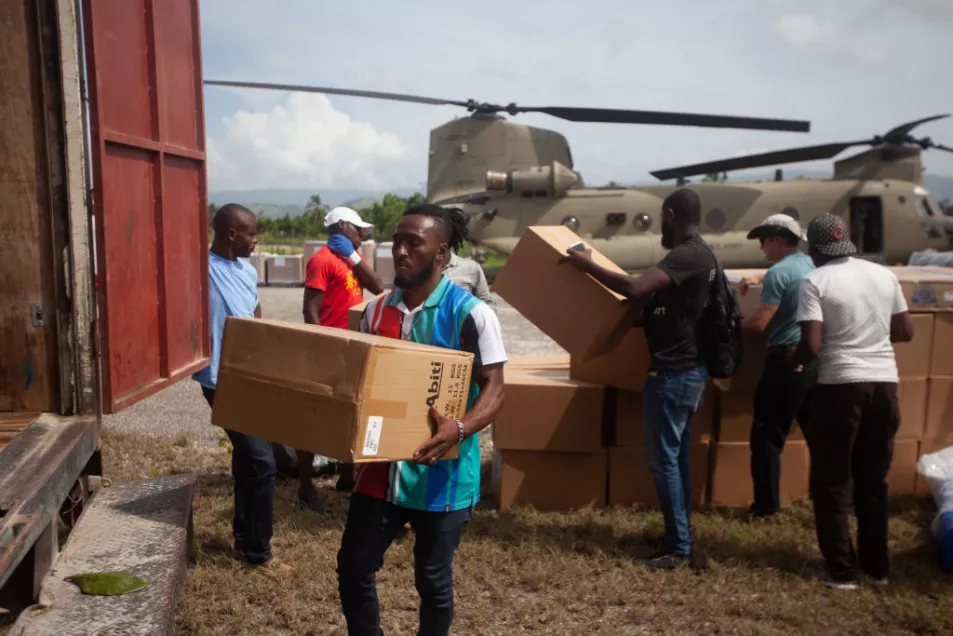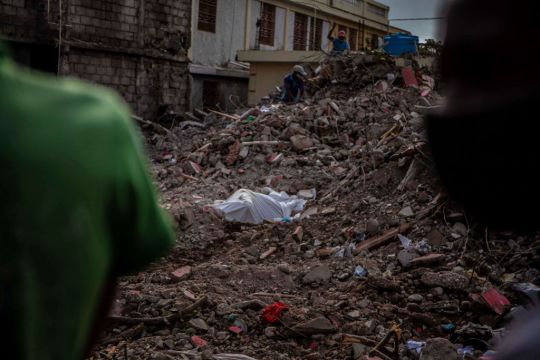Damaged or impassable roads hindered efforts on Friday to deliver aid to remote parts of Haiti devastated by an earthquake last weekend that killed more than 2,000 people as hopes of finding those still missing faded.
Landslides and cracks in the tarmac on the main inland mountain road between the southwestern city of Les Cayes and Jeremie to its northwest, two of the hardest hit urban areas, made it harder to dispatch aid to farming communities short on food and drinkable water. The route was littered with boulders and the occasional stranded truck, according to a Reuters reporter.
"We are all absolutely overwhelmed," Prime Minister Ariel Henry said in a meeting with the Organization of American States (OAS) on Friday. "Every commune, every city, every village in that area was very hard hit."
Henry repeatedly thanked foreign countries for sending assistance.
The poorest country in the Americas, Haiti is still recovering from a 2010 quake that killed over 200,000 people.
It was pitched into deeper instability by the assassination on July 7 of President Jovenel Moise, by what authorities say was a group of largely Colombian mercenaries.
A powerful storm that hit Haiti earlier this week, triggering landslides, has also made it harder to find victims of last Saturday's quake, which destroyed tens of thousands of homes and claimed the lives of at least 2,189 people.

Some 332 people are still missing, while 12,200 people were injured, authorities said.
Many hospitals remained saturated in the worst-hit areas of Haiti. At Les Cayes' airport, helicopters ferried the injured to the capital, Port-au-Prince.
The kidnapping by gangs of two doctors in the capital, including one of the few trained orthopedic surgeons in Haiti, has added to the strain. Some hospitals decided to shut down temporarily in protest, demanding that the gangs release the doctors, local media reported.
The orthopedic surgeon worked at Bernard Mevs hospital and Radio RFM said the kidnapping "paralyses the care that the hospital was beginning to provide to earthquake victims."
Digging graves
In the village of Marceline, 25 km north of Les Cayes, a dozen residents were digging out a vast pile of rubble of what was once a handful of houses. The air smelled of decomposing bodies, and residents said that at least one woman who lived in one of the buildings was still missing.
Elsewhere in the village, some people dug graves to prepare for funerals, while other families are still waiting for the corpses of their loved ones to be recovered from the rubble.
Amerlin Dorcy surveyed rescue efforts at the house where, on Saturday morning, his mother Seralia Dejoit and others were attending a voodoo ceremony when the quake struck.
She and other worshippers were buried by the falling cement.
"She's still missing, we don't even have her body to bury," said Dorcy, explaining that his mother had been called upon to sing at Saturday's ceremony by the head priestess.
The latest calamity brought back memories for Dorcy of the 2010 quake, which he survived by fleeing from the collapsing three-story building he was inside in Port-au-Prince.
"Now there's another earthquake and it's my mother who's the victim," he said. - Reuters







